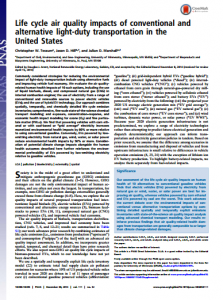Full Title: Life cycle air quality impacts of conventional and alternative light-duty transportation in the United States
Author(s): Christopher W. Tessuma, Jason D. Hillb, and Julian D. Marshalla,
Publisher(s): Proceedings of the National Academy of Sciences of the United States of America
Publication Date: July 1, 2015
Full Text: Download Resource
Description (excerpt):
Commonly considered strategies for reducing the environmental impact of light-duty transportation include using alternative fuels and improving vehicle fuel economy. We evaluate the air quality-related human health impacts of 10 such options, including the use of liquid biofuels, diesel, and compressed natural gas (CNG) in internal combustion engines; the use of electricity from a range of conventional and renewable sources to power electric vehicles (EVs); and the use of hybrid EV technology. Our approach combines spatially, temporally, and chemically detailed life cycle emission inventories; comprehensive, fine-scale state-of-the-science chemical transport modeling; and exposure, concentration–response, and economic health impact modeling for ozone (O3) and fine particulate matter (PM2.5). We find that powering vehicles with corn ethanol or with coal-based or “grid average” electricity increases monetized environmental health impacts by 80% or more relative to using conventional gasoline. Conversely, EVs powered by low-emitting electricity from natural gas, wind, water, or solar power reduce environmental health impacts by 50% or more. Consideration of potential climate change impacts alongside the human health outcomes described here further reinforces the environmental preferability of EVs powered by low-emitting electricity relative to gasoline vehicles.
